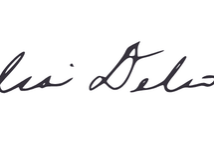God Within Us, Around Us, Before Us: Hope in the Divine Milieu
Dear Friends,
The twentieth-century theologian, Karl Rahner, was once asked by a colleague:“Wouldn’t it be better to keep quiet about God? After all, the word has been so misused, so tainted, so violated. It is the most loaded of all human words.” To which he replied: “Precisely for that reason, I may not dispense with it.” Rahner certainly had his finger on something important here. He realized that in order to speak or write, we must use language, so we must say something about our encounter with God, the “incomprehensible mystery” as he named it, however inadequate. Instead of ceasing to talk about God, or simply talking about God in ways that have been misused for political or ecclesiastical ends, it is crucial for philosophers and theologians in particular to learn to talk anew about God.
The Jesuit scientist Pierre Teilhard de Chardin was acutely aware of the need to update our metaphors for God. He believed that we have yet to find a God whom we can truly adore, a God commensurate with the vastness of the cosmos. In 1950, he noted in his diary: “God is not dead— but CHANGES.” And later, in a letter to a friend, he writes of our task to effect a “transformation . . . of the ‘God of the Gospel’ into the ‘God of Evolution’—a transformation without defamation.” In Teilhard’s view, the dimensions of classical Christianity and of religion generally are not large enough, not sufficiently dynamic to animate the contemporary world and develop a process of spiritualization that parallels our advances in scientific knowledge and technology.
Concerned with the great spiritual needs of our time, the Center for Christogenesis is committed to a bold revisioning of contemporary theology, one that offers meaning, direction, and hope in a world in crisis. Like Teilhard, we believe that the profound hunger for a greater vision and zest for life are found in the creation of a new “spiritual atmosphere,” in which the love of God is resolutely connected with faith in the becoming of the world. This is a vision of a deeply personal God, operating as the engine of evolution and growing with us from within into ever higher levels of consciousness. As Teilhard wrote at the end of his final essay “The Christic”: to see this radiant vision “appear only once, in a single mind, is enough, for it is impossible for anything ever to prevent it from spreading universally and setting everything ablaze.”
As we work to realize Teilhard’s transforming vision, we continue to ask for your support which provides us with the means to carry out the plans and projects needed to grow our message universally and to set everything ablaze with the fire of divine love. Indeed, it is only because of your sustained graciousness and generosity that we are enabled to reap new life in the world and create a better tomorrow . Please know that every donation, large and small, is a “gift of encouragement” that helps us together give rise to the type of spiritual awakening and theological renewal for which Teilhard hoped. Many thanks in advance for your kind consideration!
Every best wish,

Robert Nicastro
Executive Director
 View print-friendly version
View print-friendly version
7 Comments
Related Posts

Thank you for starting our 10th year strong!
Because of your generosity and commitment to the mission of the Center for Christogenesis, we not only met our goal but exceeded it, surpassing $75,000. This remarkable response speaks to…

I believe, and deeply feel, God’s presence in all creation. It’s closer to me than my breath or the beating of my heart. Psalm 139 says it well. “Where can I flee from your presence? If I go up to the heavens, you are there; if I make my bed in the depths, you are there. Even there your hand will guide me, your right hand will hold me fast”. I feel the pain and destruction we’re causing our Creator/ourselves. It’s crucifixion all over again, everywhere, everything.
The way this post has presented the idea of who God is, is so vague as to be meaningless. I like the way the Bible portrays Him, with solid facts.
I understand your comfort in dealing with certainty and simplicity, even if you worshipped the Quran for its solid facts (as a billion others do) rather than the Bible.
It is difficult to comprehend how the ineffible God can be circumscribed in ‘solid fact’. “In the beginning was the Word and the Word was with God and the Word was God” – these words are explosive of awe and wonder, hardly ‘solid’.
There are no facts concerning the Great Divine Mystery, God, Creator. There was no ” court reporter” capturing every word and move. No tape recording or video recording diligently preserving each moment. No. we have 3rd hand interpretations written in metaphors congruent with the time and culture. In a language not our own then translated many times such that the original meaning of the individual words have been lost as well as the cultural context to which they belonged.
Was the Bible “divinely inspired”? Who knows? I believe ALL inspirational reading is divinely inspired. Sometimes the divine message lies hidden under centuries of horizontal and vertical knowledge which few care to take the time to unravel.
This is not an easy concept to say “yes” to, but to grow in understanding and faith it is a necessary first step in understanding the growth of God. Why? Because it is a first step in understanding that we do have a critical role in God’s continued development. God unfolds in our decisions.
The God of the Old and New Testament is so very different because of growth. God is not static. It is possible to clearly observe the growth of God even today. How? By just recognizing where personal and cultural egos are no longer the driving forces and have transformed through opening hearts and minds. Becoming compassionate, full of mercy, and able to deliver this to everything. All matter is kin.
Well said Kay.
I find this perspective so awe inspiring and personally evocative of reverence. The cosmic vision of God in creation linked so intimately and substantially with, what I can only express as, ‘the grain of sand’ -the matter in which I exist – and all that is embraced. Wonder and awe can take us out of our obsession with our singularity but it begs the question – how does one worship such a God? It seems that ‘Incarnation’ – that of Jesus, of self, of community of persons offers such a wide range of questions, of challenges, of visions and callings. Matter is not only the cosmic immensity; we can never abandon the glory of that which is the mundane. That is a mystery in itself.